AI at Work
Does Using AI for SEO Content Creation Affect Your Rankings? Here Are Some Myth Busters

Neelam Goswami · Content Marketing Associate
May 23rd, 2025 · 11 min read

AI has revolutionized enterprise SEO strategies, and offers unprecedented capabilities for content scaling, data analysis, and workflow automation. Yet, even with these transformative benefits of AI for SEO, we consistently encounter the same hesitation during conversations with marketing leaders.
"Will Google penalize us for using AI?"
Working with Fortune 500 marketing teams, we've seen this concern firsthand. CMOs express reservations about using AI marketing solutions — despite facing significant content production bottlenecks — because of what they view as a risk to their hard-earned domain authority.
Meanwhile, enterprise marketers feel caught between the pressure to produce more high-quality content and the fear that AI-generated material might trigger algorithmic penalties.
However, a lot of these concerns are based on myths.
A good understanding of how search optimization works, and what search engines like Google look at when evaluating your content, can put those inhibitions around AI and SEO to rest.
The question isn't whether to use AI for SEO, but rather how to leverage it strategically within search engine guidelines.
Google’s stance on AI-generated content
How to ensure AI content meets E-E-A-T guidelines
Recent updates on AI content evaluation
The benefits of using AI for SEO
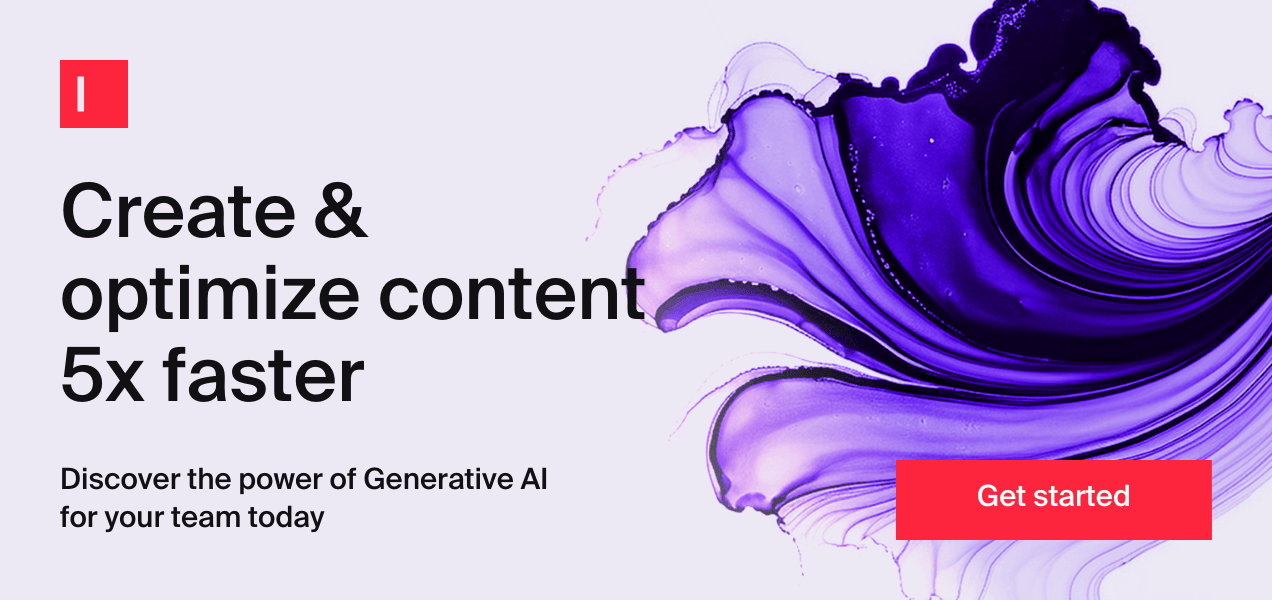
How does content SEO work?
SEO works by combining content and structure in a way that helps people find what they are looking for.
Effective content SEO requires an understanding of search algorithms, user intent, and content relevance. Modern content SEO goes beyond just keywords and backlinks. It requires creating valuable resources that genuinely address searcher needs and intent.
That’s because search engines have become increasingly sophisticated at evaluating content quality. Factors like depth of coverage, originality, readability, and topical expertise all influence search rankings.
To align with Google's helpful content requirements, content must demonstrate E-E-A-T (Experience, Expertise, Authoritativeness, and Trustworthiness) to perform well, particularly in YMYL (Your Money, Your Life) categories.
Google’s stance on AI-generated content
Google's take on AI-generated content is straightforward, but it’s also evolving.
While a lot of factors are at play when it comes to ranking content, Google made it clear in 2023 that its goal is to reward only high-quality content, regardless of how it was produced.
It does say that automating content creation as a means of manipulating search rankings is considered spam and violates Google's policies. But, of course, not all use of AI content generation is spam.
Using AI to create helpful, relevant, and factually correct content is not against Google's guidelines, nor does it damage your search relevance.
Here are a few things to consider:
TL;DR: Google & AI Content — What You Need to Know
Google's official stance
AI-generated content is not against Google's rules — as long as it's helpful, original, and created for people, not just to rank.
Spammy, low-quality AI content designed only to manipulate rankings is against Google’s spam policies.
Google's ranking priorities (same for AI or human content)
Content should demonstrate E-E-A-T: Experience, Expertise, Authoritativeness, and Trustworthiness.
Focus on "people-first content" — content that answers real questions or solves real problems.
Avoid "search engine-first" content — content written only to game algorithms with keywords.
AI use cases Google is okay with
Using AI to brainstorm, draft, or enhance high-quality human-reviewed content.
Automating parts of the process (like meta descriptions or summaries) to save time.
What to avoid
Mass-publishing unedited AI content at scale.
Auto-generating pages with no added value or originality.
Using AI tools to copy or rephrase existing content with no human oversight.
Pro Tip: Think of AI as a tool, not a replacement—Google rewards helpful content, no matter how it’s made, but penalizes content that’s lazy, thin, or misleading.
E-E-A-T principles and AI
Google's E-E-A-T principles — Expertise, Experience, Authoritativeness, and Trustworthiness — play a significant role in the evaluation of content, including that generated by AI. After the algorithm identifies relevant content for any search query, it prioritizes the content based on how helpful it is to the user.
This is where content that demonstrates a good mix of expertise, experience, authority, and trustworthiness will usually rank higher.
Note: For topics that could impact users' health, financial stability, welfare, or safety in general, Google gives much more weight to E-E-A-T alignment. These are YMYL topics where fact-checking and trustworthiness are extremely crucial.
How to ensure AI content meets E-E-A-T guidelines
When leveraging AI for content creation, ensuring alignment with Google's E-E-A-T principles requires a strategic human-AI collaboration approach. To make your AI-generated content more authentic, trustworthy, and relatable, here's what you should do:
Include real experience
AI lacks lived experience, so incorporate genuine perspectives from your team's subject matter experts. Have team members with hands-on experience review AI-generated content and add their unique insights, case studies, and practical examples that demonstrate real-world application. Personal anecdotes and lessons learned from real situations significantly enhance the "Experience" component that AI alone may not provide.
Validate with expertise
AI can compile information but may not be able to independently verify its accuracy in specialized fields. Establish a review process where qualified experts examine AI outputs for technical accuracy, current best practices, and industry-specific nuances. Consider adding expert credentials and qualifications within the content to signal to both readers and search engines that the information comes from knowledgeable sources.
Build authority through rigorous research
Strengthen AI-generated content by incorporating data from respected industry sources, academic research, and recognized authorities. Make sure all statistics and claims are properly attributed with recent citations. This creates a foundation of credibility that search engines recognize. Link to authoritative external resources that complement your content.
Establish trustworthiness through transparency
Both search engines and audiences favor businesses that are forthright about their content development process. Consider including an editorial policy that explains how your organization ensures accuracy and quality. Implement consistent fact-checking protocols for AI-generated content and promptly update information when industry standards or data changes. Clear bylines, up-to-date content, and visible update histories signal commitment to accuracy.
Customize for your audience's needs
Without the right inputs, an AI content creation platform tends toward generalization, but E-E-A-T demands specificity. This is where audience personalization on Typeface can help. By saving detailed customer personas in your AI content platform — including demographics, interests, and purchasing behaviors — you can generate content that resonates with each distinct audience group. When your content addresses the queries or challenges of your enterprise customers, it naturally fulfills Google's requirements for valuable, relevant information.
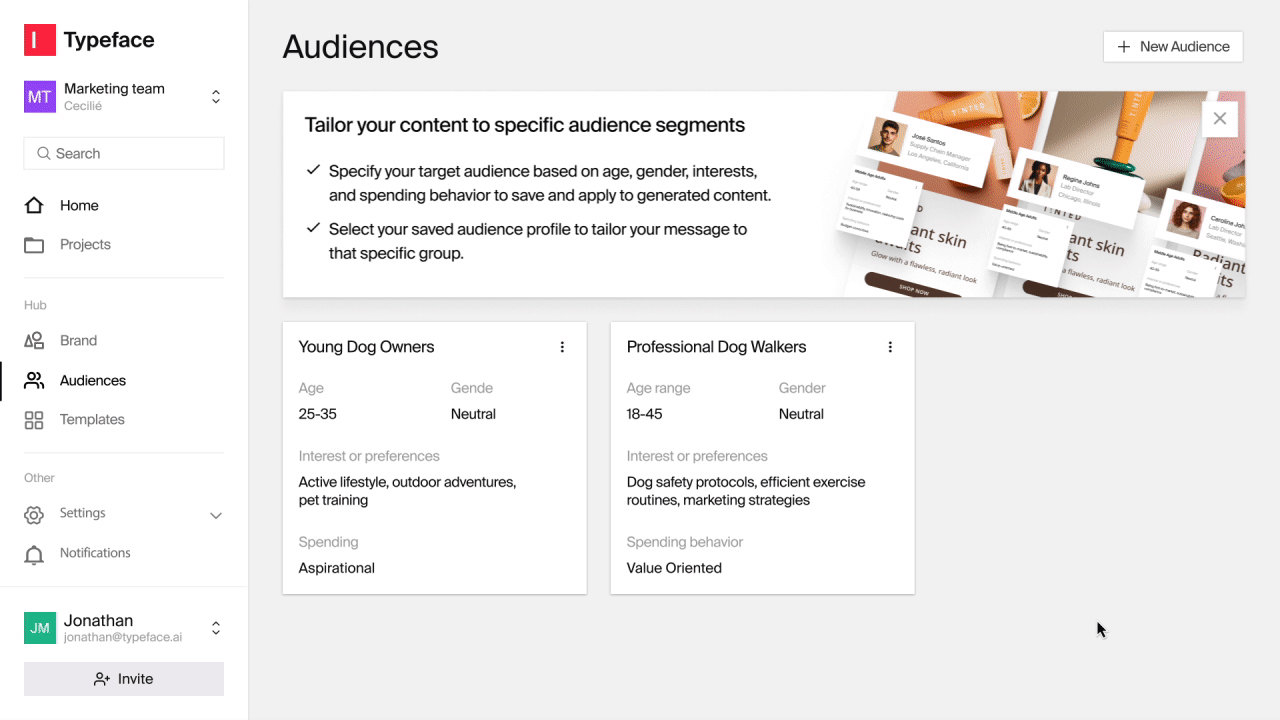
The Content Explainability feature also lets you analyze the content generated on Typeface based on your goals and audience. Apart from assigning an SEO score to the content, the Explainable AI shows you how closely the content aligns with your chosen target audience, and why. It can also suggest the best actions you can take to improve content performance.
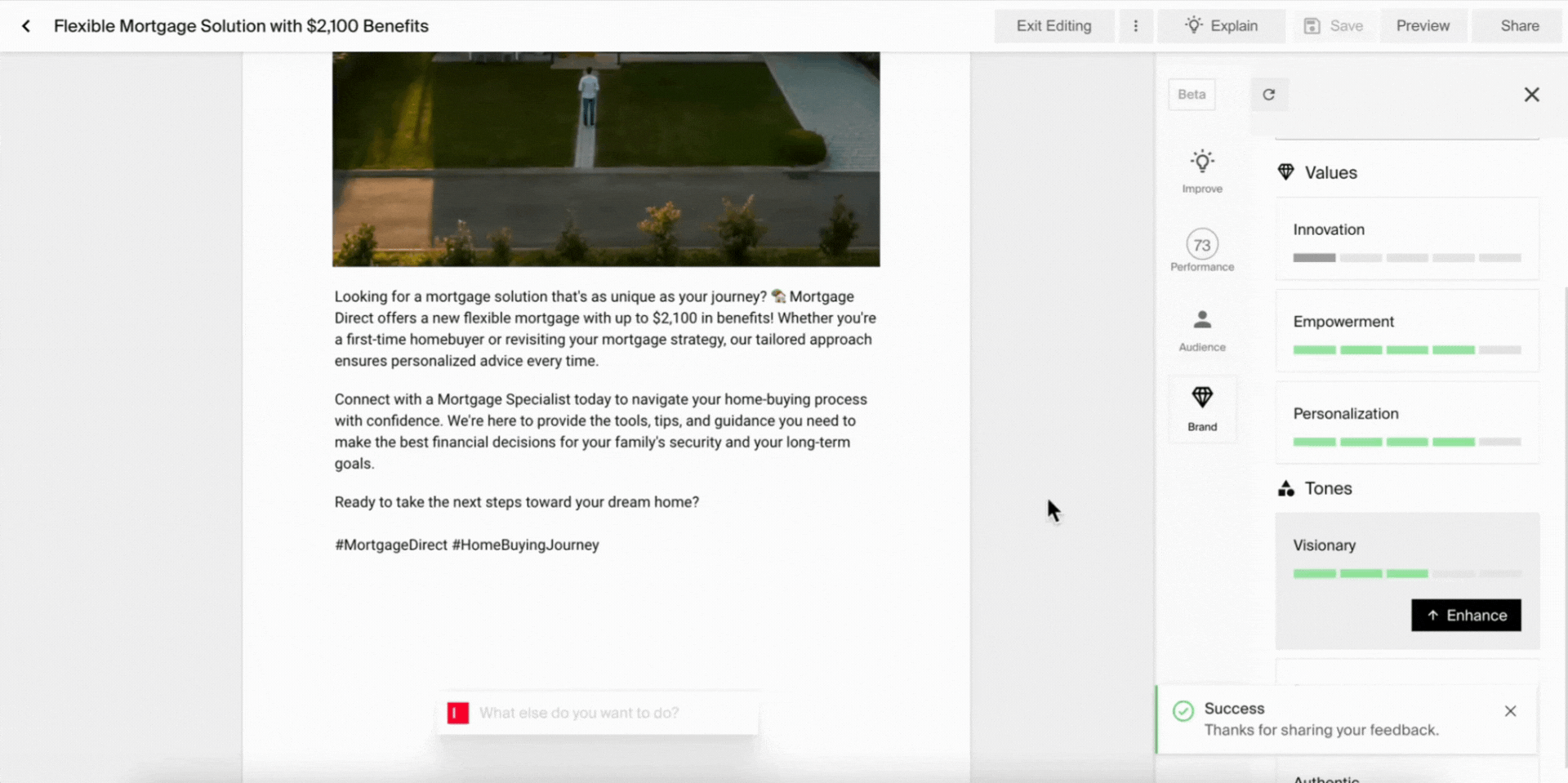
The key is transforming generic AI drafts into highly targeted content. Replace broad suggestions with specific, industry-relevant guidance that demonstrates your deep understanding of enterprise pain points.
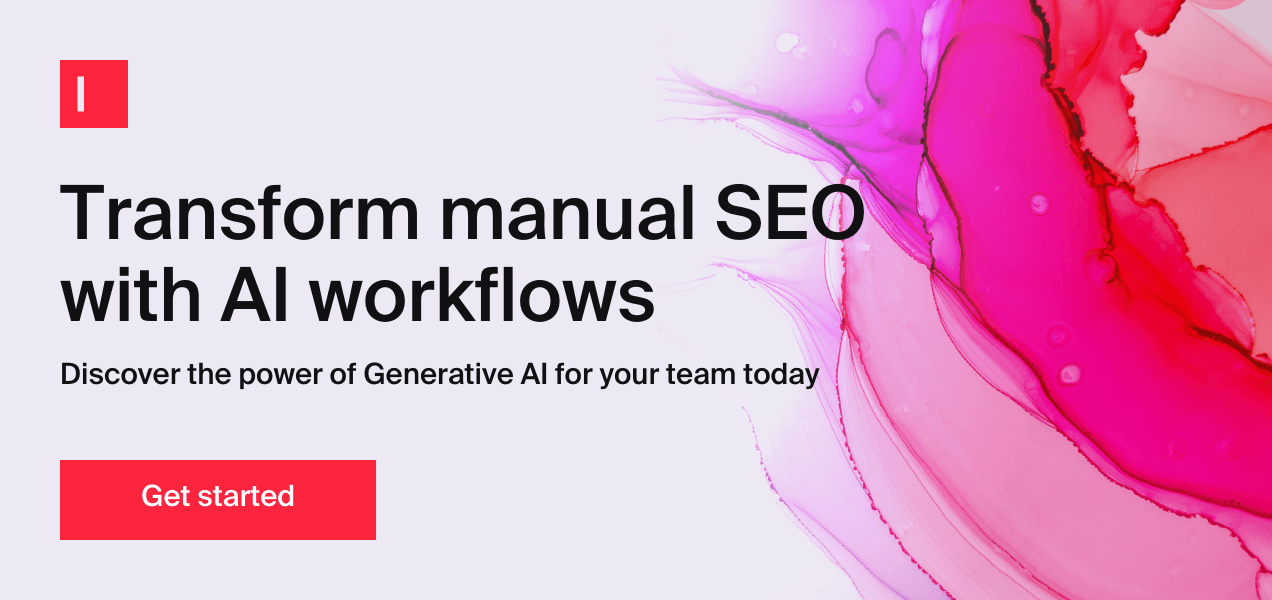
Maintain consistency across all your content
Another way to earn audience trust (and consequently rank better in search with AI-generated content) is by maintaining consistency in quality and brand alignment. Brands that look, feel and sound the same across all of their content on all channels can establish trust and credibility, and Google rewards trustworthiness.
Typeface’s Brand Hub helps with this, serving as a centralized repository for all your brand guidelines, compliance requirements, assets, and more. You can save text and image styles, rules, voices and brand values that will be applied across all generated content, ensuring consistent, on-brand output.
Our Brand Agent can also analyze your content to ensure everything aligns with your established brand guidelines and even suggest corrections or improvements where needed.
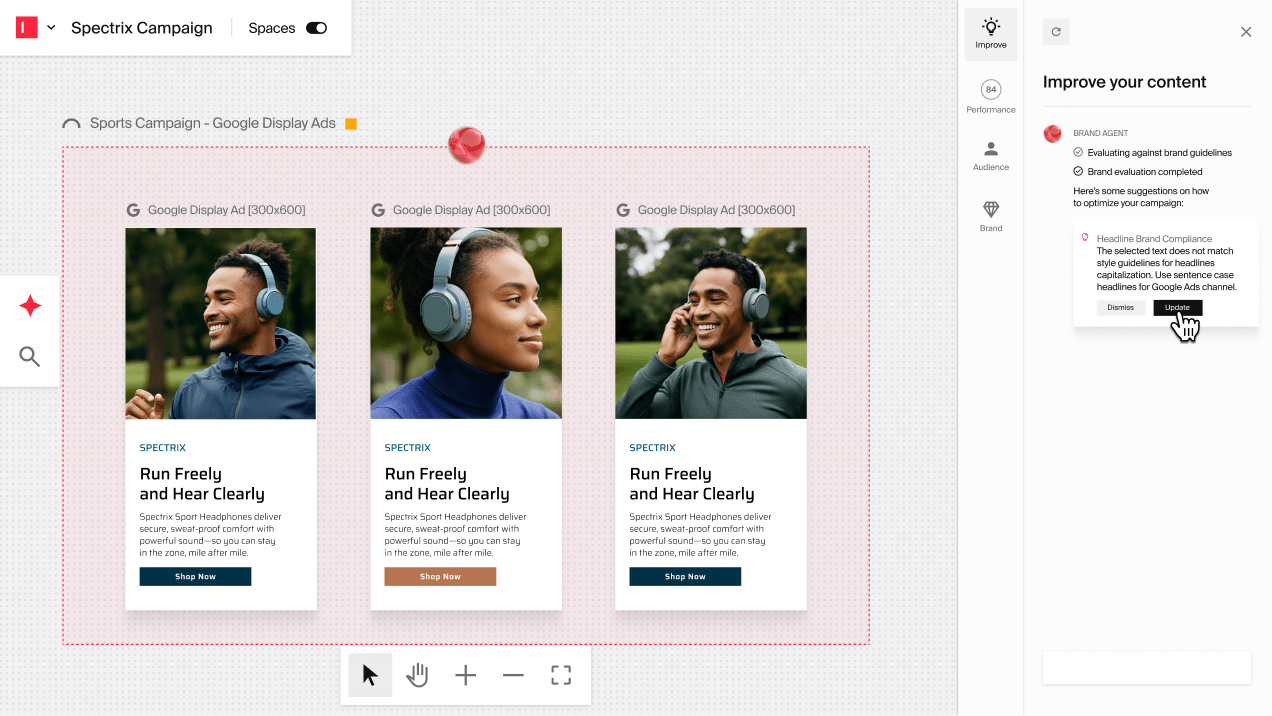
So, whether you are creating content in-house using AI or outsourcing to a marketing agency that leverages AI for SEO, you can always evaluate the content delivered for brand alignment with Brand Agent.
Add original research and insights
Differentiate your content by incorporating proprietary data or original research that only your organization can provide. This demonstrates both expertise and authority while giving search engines unique value they can't find elsewhere.
Recent updates on AI content evaluation
Google has recently updated its approach to AI content. You might find some sources simply stating that Google quality raters are now going to give all AI-generated content the lowest rating. Over the years, however, we've learned that there are a lot of nuances to content rating and Google’s ranking factors, which these sources do not delve into.
The new quality rater guidelines only reflect Google’s intention to ensure that the most helpful and reliable content reaches users. There’s a lot more to it than just identifying AI-generated content.
Some of the key changes introduced include:
Changes in spam definitions
Low rating for scaled content abuse, which involves creating low-effort and low-originality content without any manual editing or curation
Low rating for paraphrased content that has significant overlap with other well-established sources
Lowest rating for web pages where almost all of the content is auto generated or reposted from other sources
Low rating for pages with “filler” content that make it difficult to access the actual helpful content
Low rating for exaggerated or even mildly misleading claim, credential, or manufactured expertise
These changes indicate Google's commitment to cracking down on scaled, low-quality practices.
Basically, businesses don’t need to panic as long as they continue adding value to their AI-generated content and making sure that it’s relevant and beneficial to their audience.
The benefits of using AI for SEO
While marketers have valid concerns about using AI for SEO content creation, when used well, the benefits of AI content creation far outweigh the risks.
AI content creation offers significant strategic advantages for enterprise marketing teams:
Improved content consistency across teams - Large organizations often struggle with maintaining consistent brand voice and messaging across distributed marketing teams. AI content platforms can enforce brand guidelines and maintain consistency across global teams and multiple product lines, eliminating the "multiple personality" problem that could undermine enterprise SEO efforts.
Strategic resource reallocation - Beyond simple time savings, generative AI allows for strategic redeployment of specialized talent. For instance, rather than having subject matter experts drafting introductory content, they can focus exclusively on adding high-value insights while AI handles the foundational elements. This creates more efficient workflows based on each contributor's strengths.
Accelerated testing and learning - AI enables rapid creation of multiple content variations to test different approaches, formats, and hypotheses. Several enterprises have shortened their content optimization cycle from quarterly to weekly by implementing AI-assisted campaign testing protocols.
Enhanced cross-functional collaboration - AI content tools provide a common platform where SEO specialists, subject matter experts, and content creators can collaborate more effectively. Typeface offers Content Workflow Manager that streamlines content review and approval processes across teams. This improved workflow breaks down traditional silos between technical SEO considerations and content creation, resulting in more holistic optimization strategies.
Confidently leverage AI for SEO content
So, as we’ve seen, AI content creation and SEO are not mutually exclusive. Instead, using AI tools for content creation can significantly boost your enterprise marketing team’s productivity, resulting in better SEO outcomes—provided you prioritize content quality and relevance.
That is, AI should be seen as a catalyst to power up your SEO strategy rather than a replacement for human insight and creativity.
Looking to harness the power of AI for SEO effectively? Get a demo of Typeface today to find out how generative AI can transform your marketing game.
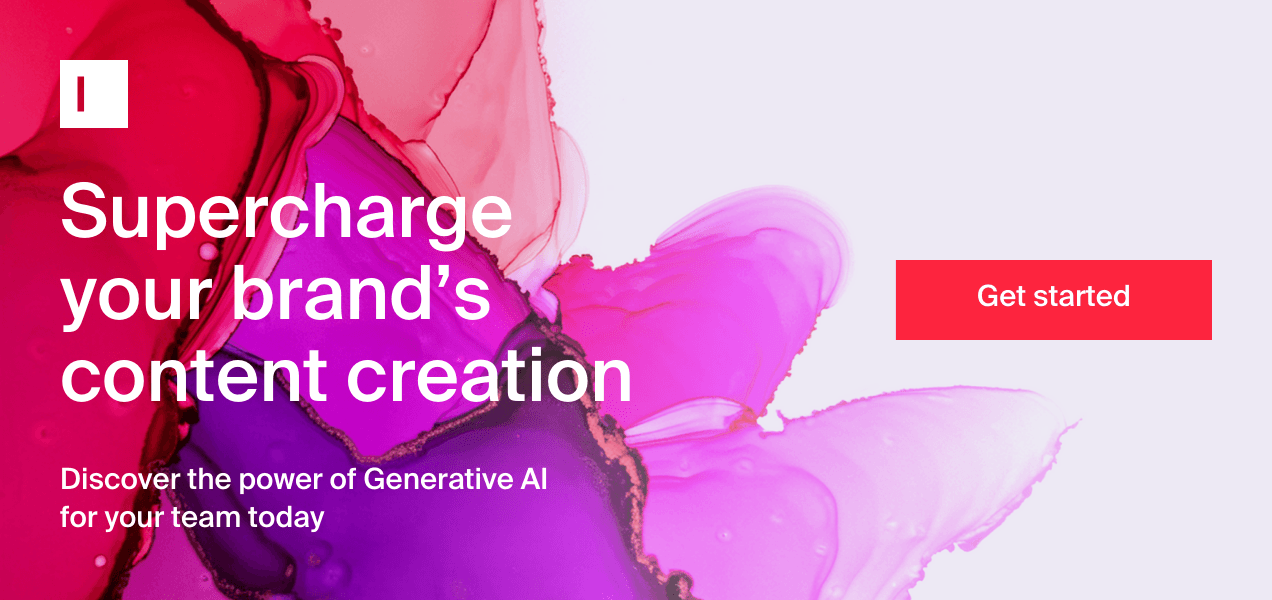
Share
Related articles

AI at Work
40+ AI SEO Prompts for Strategy Building and Content Creation

Akshita Sharma · Content Marketing Associate
February 7th, 2025 · 14 min read

AI at Work
5 Best Landing Page Examples and How to Create Them with AI Content Creators

Akshita Sharma · Content Marketing Associate
February 4th, 2025 · 16 min read

AI at Work
7 Generative AI Use Cases in Enterprise Marketing

Neelam Goswami · Content Marketing Associate
November 12th, 2024 · 15 min read